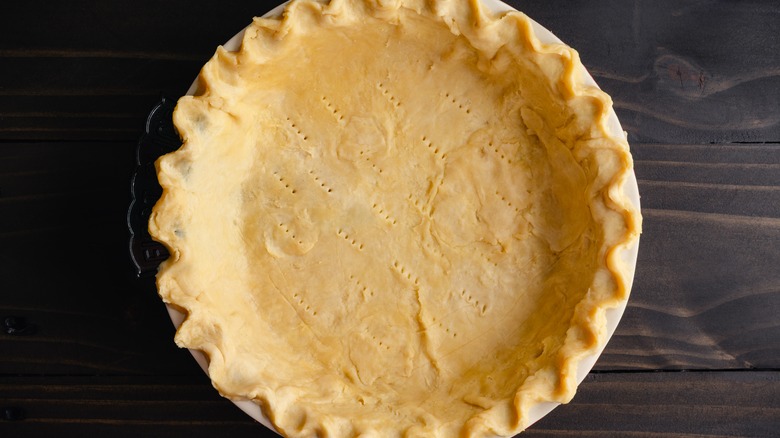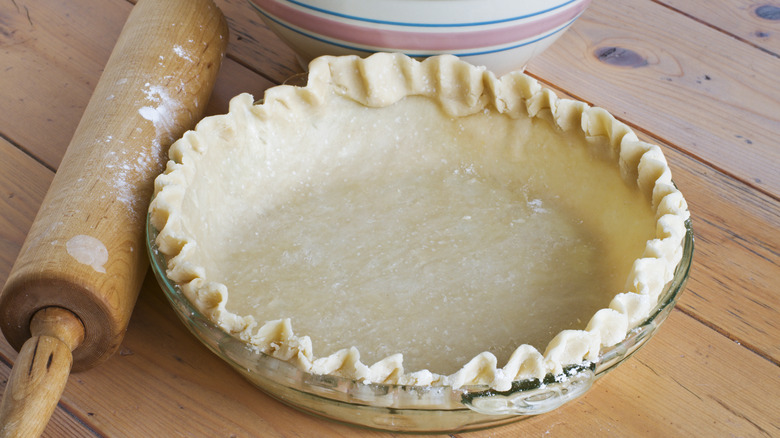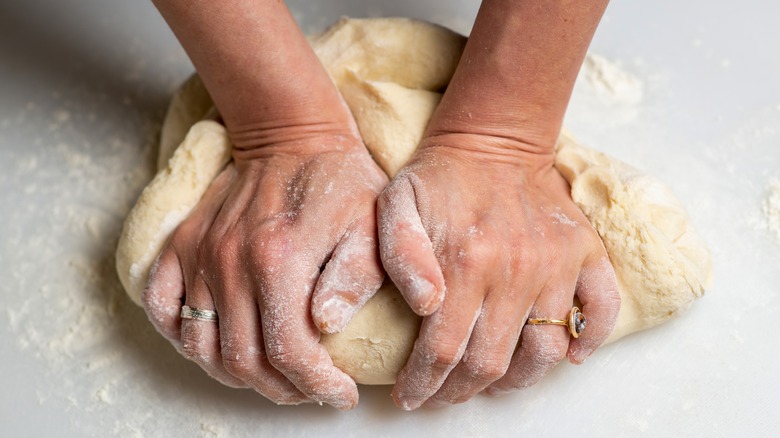Toss A Shot Of Vodka In Your Pie Crust For Extra Flaky Results
Trying to make the perfect pie crust could cause anyone to crave a shot of vodka. After all, it doesn't take much for a batch of dough to go from flaky and delicious to dense and overly hard. There are a plethora of ways for your dough to take a turn in the wrong direction. But you might want to take that shot of vodka and put it in your pie dough, rather than in a cocktail. It might make all the difference in achieving a perfectly flaky and delicious crust.
Now, it may seem counterintuitive to add alcohol to a time-tested dish such as pie crust. And the baking hack is actually relatively new, so you wouldn't be amiss if this tip is new to you. The method of putting vodka into pie dough was originally developed by chef and food writer J. Kenji López-Alt in 2007 for "America's Test Kitchen". The recipe he developed calls for the addition of ¼ cup of cold vodka as a part of the dough's wet ingredients. But don't worry about the added vodka making your dough too boozy, as the alcohol dissipates as it bakes. And the added vodka won't contribute the pie dough's flavor. Rather, it helps keep your dough from developing too much gluten, thus keeping it perfectly soft and tender when baked. As this tip has made its way across this internet, it has also garnered many fans who all praise its ability to keep pie crust tender and delicious.
The science behind the hack
So adding a little bit of vodka to your pie dough can keep it from turning tough. It's an amazingly and (almost impossibly) simple trick. So how does it work? Well, it starts (and ends) with gluten. A standard pie crust recipe calls for the addition of water in order to add moisture to your pie dough. Water also helps to develop the gluten in your dough, as the protein in your flour becomes moist when introduced to water, thus causing them to become more sticky, binding more easily to other proteins and increasing gluten content in your dough. This gluten is certainly good for some recipes, such as bread. And it is necessary to develop in most baked goods in which glutinous flour is used. However, this gluten development should be limited when making pie dough, as it can turn your crust from flaky to dry and brick-like.
Because vodka has a lower water content, containing only about 60% water, it can help prevent the formation of gluten in your dough. So, when you use vodka rather than water, there is less water, and therefore less opportunity for gluten to develop in your dough. This will keep your dough perfectly soft. Though it should also be noted that the resulting dough will be tackier than your average batch of pie crust, so you will need to use extra flour when rolling it out.
Other liquors can boost pie crust too
Now, don't feel as though you have to run out to the store and buy a bottle of vodka just to make this trick work. López-Alt tested this method out with several different kinds of liquor, such as bourbon, gin, and tequila, and they all yielded similar results. As long as you use a liquid with a high enough alcohol content (think liquor and not wine or beer), your alcoholic mix-in will be able to prevent gluten from forming in your dough. However, there is no need to choose a liquor based on the flavor of your filling. Because, though a whiskey cocktail would pair very well with an apple pie, you simply aren't adding enough of the spirit to impact the overall flavor of the crust. The addition simply helps with the crust's texture.
If, however, you don't have any liquor on hand, or if you simply don't keep alcohol in your home, that doesn't mean that you are doomed to tough pie crust. There are some alternatives that can help keep your dough from becoming too glutinous. Adding a vinegar such has apple cider or white vinegar can also stave off gluten formation. Vinegar can also give your crust a punch of flavor, which is an added bonus. And, of course, you can always take a more indulgent route by replacing your water with sour cream, which will give your crust a soft texture and an irresistibly tangy flavor.


